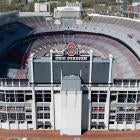There's been plenty of time for David Shaw to think about the potential 2020 postseason as college football continues to take this giant timeout. Now that the game's conference commissioners have basically told us they're willing to play the season without all 130 schools in action, we are left to wonder: Would compromise a "legitimate" College Football Playoff?
"That's the big question, isn't it?" Stanford's coach said.
It's big because ESPN is paying an average of $475 million annually for the current structure of the playoff through the 2025 season. In 2019, the payout was slightly over $462 million. Eighty percent ($367 million) went to the 64 Power Five schools plus Notre Dame to distribute amongst their members.
It's big because there is the real possibility teams could be playing different numbers of games in 2020 due to the coronavirus pandemic. Not to mention that an outbreak within a team or a spike in a region could cause games to be canceled in a moment's notice.
Imagine if, during the week of the game Ohio State-Michigan game, Ohio (currently reopening) is ready to go while Michigan (still largely shut down) cannot.
"If we get pushed back and we have to severely [alter] our season, we're living in exception land," Shaw said. "Whatever the season turns into, I think everything has to be on the table. Every bowl contract. The criteria for the bowls might not be met. Not everybody may be able to play the whole season. Some people may start; some people may have to stop. … Is a game postponed? Is it forfeited?"
When asked what constituted a legitimate playoff, CFP executive director Bill Hancock said, "Nobody has asked me that yet."
He did not say whether the contract between ESPN and the CFP anticipates any such issue.
"I'm sorry but the contract terms are confidential between ESPN and the CFP," Hancock said. "What I can tell you is we will both work together with whatever eventualities come to us."
CBS Sports spoke to several industry sources that have not seen the contract but doubted it contained specific language about the number of teams available to be judged by the CFP Selection Committee.
Could the CFP stage a legitimate championship if it comes down to only three or four conferences playing?
As it stands, the CFP has been reserved for a chosen few through its first seasons with only 11 teams filling the 24 combined semifinal spots.
If all 10 FBS conferences -- or teams within any of those leagues -- are not playing, at what point does the competition fail to become a national championship?
Is 50 schools enough? 70? If the underachieving Pac-12 can't go, does it even matter in the playoff?
One Power Five athletic director speculated that ESPN would "gladly pay" if the majority of Power Five schools were involved.
Ole Miss coach Lane Kiffin put it more bluntly: "To me, there's college football, then there's the SEC plus a few teams -- Clemson and Ohio State."
Fifteen of those 24 spots have been filled by SEC teams, Ohio State and Clemson. Would that be enough?
"I'm just not getting into -- because I don't have to -- how many conferences are playing football," Hancock said. "I really think it's almost a waste of time to speculate about that. Everything you see people speculate about seems to change."
Sure, but the most oft-repeated phrase in college circles during the pandemic, as Shaw said, is "everything is on the table." One of those options is for teams to play conference games only.
That could mean a full 12-game schedule substituting more conference games in place of nonconference games. If the season is shortened, it could mean just scheduled conference games (eight or nine depending on the league).
"The bottom line is, if we go to the conference schedule, how then … can you compare across conferences?" Shaw asked. "If there are no crossover games, how can you truly judge outside the eyeball test? That's a tough thing to truly judge."
That also conjures the increased possibility of the SEC -- the most powerful conference -- snagging multiple berths. At the conclusion of the 2017 season, half the bracket was from the SEC -- Alabama and Georgia. The league was guaranteed a national title when both won their semifinal games. (Bama beat Georgia in overtime in the CFP National Championship).
There is no limit to the amount of teams from one conference that can play in the CFP.
The CFP Board of Managers (school presidents) have a regularly-scheduled meeting on Tuesday. Expanding the four-team bracket is one way to account for the possible disparities of the coming season.
The newest member of the board is West Virginia president Gordon Gee. The 76-year-old has long been a supporter of an eight- or 12-team playoff.
Gee told CBS Sports that he expects expansion of the four-team bracket "will be one of the conversations."
"But I haven't seen the contract," Gee added. "I don't know. Any change you make to the playoff is going to have to have a glide path. You're not going to be able to do it overnight."
Hancock reiterated the structure will not change because of the pandemic.
"It's going to be four," he said. "There hasn't been any talk in our leadership group about changing for this year. Not any."
Though Shaw has yet to lead his team to the playoff, he is one of the most respected voices in the game. On his watch, Stanford has won three Pac-12 titles and two Rose Bowls. He is currently the chair of the NCAA Rules Committee and a member of the American Football Coaches Association Board of Trustees.
"I do believe Mr. Hancock could come out and say, 'There is no change to the playoff,'" Shaw said, "or he could come back out and talk to all the people that need to be talked to and say, 'Hey, these are extenuating circumstances. Maybe we do need to augment [the playoff].'"
More questions: Does a team or conference that doesn't play have any access to that ESPN money? Will ESPN owe the entire $475 million if some -- or certain -- teams don't participate?
Less teams in the mix could mean less eyes watching the product.
"[That] will 1,000-percent be a discussion," said Vince Thompson, founder and CEO of MELT, an Atlanta-based sports and entertainment marketing agency. "The cable business was predicated, all these [media] rights payments were predicated on 100 million [cable subscriber] homes. Now let's say they're down to 80 million. This pandemic is going to accelerate cord cutting because there's not live sports to watch."
Cord cutting in general -- the concept of dropping linear cable for streaming platforms -- has increased during the pandemic, according to several reports. ESPN's subscribers shrunk 4.5 percent in the most recent quarter while its streaming service, ESPN+, more than doubled from November 2019 to February 2020, going from 3.5 subscribers to 7.6 million. An ESPN spokesman had no comment on the CFP deal or structure.
"No one has ever contemplated this," said a person familiar with rights fees negotiations.
College athletic budgets were severely impacted in March when the NCAA Tournament was canceled. Schools got only 37 cents on the dollar of the tournament revenue typically received annually from the NCAA.
Any shortfall in rights fees from the CFP or New Year's Six bowls would have a similar impact. Consider the Power Five conferences are guaranteed a minimum of approximately $100 million each for participating in the CFP. That includes a $66 million annual base payout. All five conferences except the ACC get $40 million from their "contract" bowls -- Big 12-SEC (Sugar), Big Ten-Pac-12 (Rose). The ACC gets $27.5 million for playing in the Orange Bowl. There is an additional $6 million to each conference that sends a team to the CFP.
The Orange Bowl Committee is hosting the 2021 CFP National Championship at Hard Rock Stadium in Miami Gardens, Florida. There is another wave of questions to be answered if the season is pushed back.
The biggest has yet to be asked by Orange Bowl chief executive officer Eric Poms: Will South Florida lose its place in line with the CFP if the game is not played? The 2022 title game is scheduled for Lucas Oil Stadium in Indianapolis.
Atlanta lost the Final Four in April due to the pandemic. Indianapolis is next in line for that as well in 2020.
"My philosophy is when the time is right [to ask], the time is right," Poms said. "There are clearly bigger decisions going on. I noticed obviously when the Final Flour was in Atlanta and [got canceled]. We would try to be [flexible] if the CFP is delayed. Right now, we're focused on Jan. 11 [the date of the championship game]."
Poms was asked Shaw's "big question:" Does there need to be full participation of all 130 FBS teams to make the championship game "legitimate?"
"Candidly, I have no idea," Poms added. "The way we view it, it would be pretty special for South Florida for a major event … where tourism is so needed right now. The spotlight of college football would an incredible stage."





















